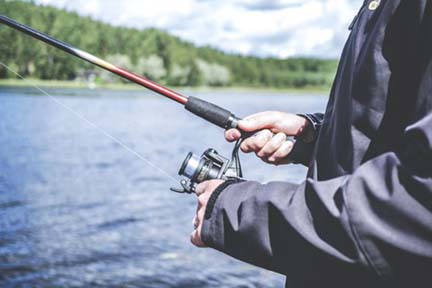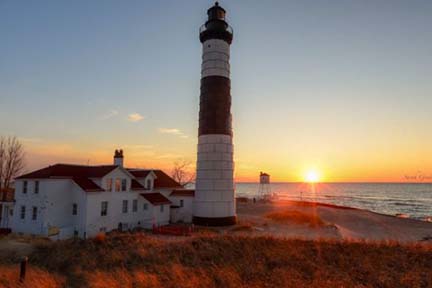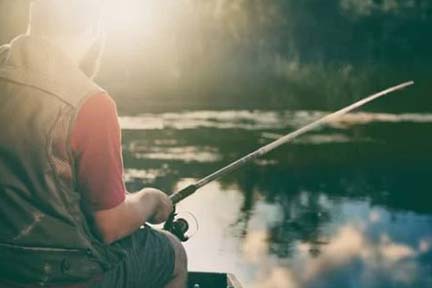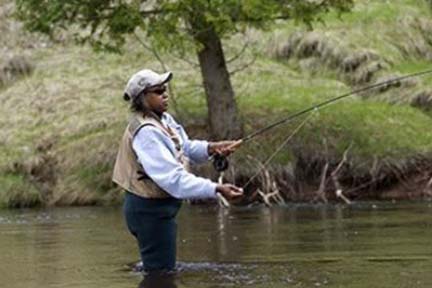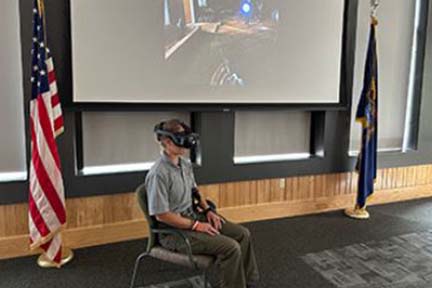The expanding mental health mission of conservation officers
By KATIE GERVASI
Michigan Department of Natural Resources
Editor’s note: This article discusses sensitive topics. If you or someone you know is experiencing a mental health crisis, or would like free, anonymous help, call or text the Suicide and Crisis Lifeline at “988.”
For some, a bad day is just that – a bad day.
But for many Americans, bad days outweigh the good, and that can take a defeating toll on one’s mental, and even physical, health.
In 2021, it was reported that more than one in five U.S. adults, not including the homeless population, lived with a mental illness.
The National Institute of Mental Health defines a mental illness as either “any mental illness,” which varies in impact, or a “serious mental illness,” which results in serious functional impairment that interferes with or limits one or more major life activities.
Whether it’s a trusted friend, family member or licensed therapist, help can come in many forms. It’s important for those seeking assistance to do it in a way that feels comfortable to them.
Responding to the need
 Today, there are an additional 250 law enforcement officers, dressed in green, trained and prepared to help during mental health emergencies. Today, there are an additional 250 law enforcement officers, dressed in green, trained and prepared to help during mental health emergencies.
Gov. Gretchen Whitmer signed legislation July 11 that authorizes Michigan Department of Natural Resources conservation officers to actively help individuals they encounter who are experiencing a mental health crisis.
“When it comes to responding to a mental health emergency, every second counts,” said Conservation Officer Jeremy Sergey, who patrols Marquette County. “When someone is considering harming themselves and we have to wait for another agency to arrive, that could be the difference in them becoming seriously injured or injuring someone else.”
Senate Bill 59, sponsored by state Sen. John Cherry, revised the mental health code to include conservation officers.
As peace officers, conservation officers are fully licensed law enforcement officers through the Michigan Commission on Law Enforcement Standards and are the oldest statewide law enforcement agency in Michigan.
Despite having the same core training as other statewide law enforcement agencies, prior to July 11, conservation officers were not legally authorized to help someone experiencing a mental health crisis.
This meant they had to stand back and hope the person could self-de-escalate or had to contact another law enforcement agency and hope help would arrive in time.
“I lost a beloved cousin in an (out-of-state) park to suicide,” said state Rep. Jennifer Conlin, during a May health policy committee meeting. “The conservation officer watched him sitting there for 30-40 minutes, knew he was in major distress. He approached him a couple of times, couldn’t get him to talk about it.
“He couldn’t call anyone because he wasn’t making a disturbance. Unfortunately, he witnessed my cousin pull out a firearm and take his own life. He’s traumatized by that and felt like he could’ve done something.”
With the new legislation, conservation officers can now immediately help individuals experiencing a mental health crisis by taking them into protective custody so they can be evaluated by an expert, regardless of where they are working.
“We care about the people we serve and protect, and when our officers encountered these situations, without this authority, it placed their safety and safety of others at risk,” said Dave Shaw, chief of the DNR Law Enforcement Division.
Mental illness does not discriminate
|
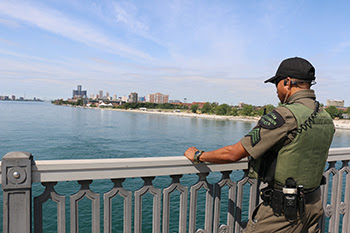 Shaw said he receives administrative notifications of critical incidents that take place across Michigan. In each one where conservation officers were directly involved, the DNR requires officers to receive assistance from a counselor to help process the event. Shaw said he receives administrative notifications of critical incidents that take place across Michigan. In each one where conservation officers were directly involved, the DNR requires officers to receive assistance from a counselor to help process the event.
Shaw said critical incidents are occurring weekly statewide without being limited to cities, rural areas or any one specific region.
Conservation officers are in a position to help as they patrol in all 83 counties of the state and conduct daily rural and urban patrols.
“It’s not just state parks we respond to,” Sergey said. “Often, we are the only officer on duty in rural areas at times. This bill being reclassified means we can now respond when we may be the only ones working.”
Sgt. Damon Owens is a DNR law enforcement supervisor based in Wayne County who also supervises Belle Isle Park, an island offshore of Detroit in the Detroit River.
“Working Belle Isle has opened my eyes,” Owens said. “I have witnessed or investigated several instances of unfortunate life experiences. It’s a beautiful place of peace where, unfortunately, sometimes people go to jump off a bridge or overdose on drugs. It’s become more common and happens on any given beautiful day – the more beautiful the day, the more it seems we see. It could be a veteran, homeless individual or anyone experiencing a mental health emergency.
“We used to have to rely on our ‘verbal judo’ to convince individuals in crisis to come down and self-volunteer to go to a hospital or call another agency to place the individual in protective custody. When this happens, a person often becomes more irate, and it’s harder for them to volunteer or we find out later down the road something happened that we could have prevented.
“I’m confident that we will now save more lives.”
Nature of the job
|
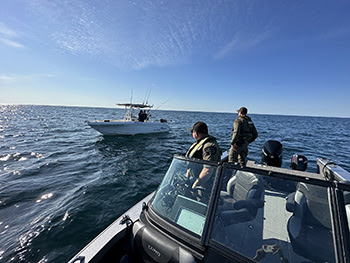 As a staple in the law enforcement community, conservation officers serve a unique role, as they can check in and out of duty when help is needed. This is particularly helpful where there is a shortage of law enforcement presence or many miles between officers. As a staple in the law enforcement community, conservation officers serve a unique role, as they can check in and out of duty when help is needed. This is particularly helpful where there is a shortage of law enforcement presence or many miles between officers.
“When we look at a conservation officer in today’s world, things have changed dramatically,” said state Rep. Curtis VanderWall, during a health policy committee meeting in May. “Especially over past 10 years with a shortage of everyday state troopers, sheriffs and city police, conservation officers get called in a lot of cases they historically wouldn’t be brought into.”
Conservation officers base their day around fish, game, boating, snowmobiling and off-road vehicle patrols, averaging contact with more than 400,000 people each year.
The nature of the job means that they are usually contacting people who have a firearm, knife or other type of tool common for hunting and fishing.
“Every time a DNR officer goes to a call there’s a gun,” said state Rep. Mike Mueller. “When they go into the woods, there may be people experiencing a mental health crisis, carrying firearms. They are in pretty dangerous situations, and they need to have the tools to mitigate those situations.”
Support and training
It’s important that law enforcement officers receive training to safely handle these mental health crisis situations in the moment and have follow-up resources to ensure they are caring for their own well-being.
Conservation officers carry a “care card,” which includes the names and contact information for several resources they can immediately contact if they want to talk with someone.
“Mental health is very important to law enforcement, and we are very proactive in our training,” Shaw said. “It’s a current and developing topic to the point where a lot of calls we go to have a mental health component and we will continue to increase this focus in our training.”
Virtual reality
|
 Conservation officers are now using virtual reality for mental health crisis training. Conservation officers are now using virtual reality for mental health crisis training.
“This is unique because it immerses the officer in a realistic environment that cannot be replicated using traditional law enforcement training scenarios,” said acting Lt. Mark Papineau, who oversees the DNR’s conservation officer training programs.
Officers wear a virtual reality headpiece, which takes them through several different mental health scenarios, including bipolar disorder, autism and suicide. Each scenario starts with the officer experiencing the perspective of the person having a mental health crisis.
“Virtual reality teaches officers to use critical thinking and de-escalation skills, coupled with empathy, to help someone experiencing a mental health crisis,” Papineau said. “After experiencing that perspective, officers tend to have greater success de-escalating individuals.”
Next, the officer goes through the scenario again, but this time as the responding officer, and must make decisions about how to work with the individual.
Based on the officer’s decisions, the incident can either escalate or de-escalate. If a choice escalates the incident, the officer is presented with an expanding scenario that tests their critical thinking skills while they work toward a positive de-escalation and successful outcome.
“Each scenario is a win-win; there is no ‘bad’ ending,” Papineau said. “Throughout each scenario, there is an added level of critical thinking skills. Some decisions are timed, which places the officer under added stress to make a quick decision, replicating real-life experiences.”
With virtual reality, officers have the chance to learn new skills and techniques that, when presented in a real-life incident, can save lives.
Favorable outcomes
In a world where societal, financial and other pressures may be constantly or increasingly present, America is moving gradually toward removing the stigma surrounding mental health issues.
The resulting availability of more help to meet the challenges of mental health crises offers the hope of more favorable outcomes being realized.
Giving DNR conservation officers the ability to respond directly to mental health incidents, without delay, is a great example of more assistance being made available to those struggling in crisis circumstances.
This new authority will allow conservation officers to step in to try to de-escalate potentially dangerous or deadly situations, when every second counts.
That type of response capability will no doubt increase the likelihood of more lives being saved and more people being helped across Michigan.
Find out more about mental health services. |
Check out previous Showcasing the DNR stories in our archive at Michigan.gov/DNRStories. To subscribe to upcoming Showcasing articles, sign up for free email delivery at Michigan.gov/DNREmail.
Note to editors: Contact: John Pepin, Showcasing the DNR series editor, 906-226-1352. Accompanying photos and a text-only version of this story are available below for download. Caption information follows. Credit Michigan Department of Natural Resources, unless otherwise noted.
Text-only version of this story.
Belle Isle: Belle Isle is a popular state park and offers bountiful fishing opportunities for anglers. Most conservation officer contacts on the island are positive, but there are occurrences of mental health crises.
Marine: Conservation officers patrol remote areas, often on the water or in the woods, with no backup. Senate Bill 59 equips them with the tools they need to help if they encounter someone experiencing a mental health crisis.
Owens: Sgt. Damon Owens stands on the MacArthur Bridge, watching the strong current in the Detroit River. The bridge is the only way for car and foot traffic to enter and exit Belle Isle and is a priority area for officers to patrol.
Scenario: A conservation officer completes a mental health virtual reality scenario from the perspective of an indiviudal considering harming themself.
Virtual reality: COs are now utilizing virtual reality for mental health training. Officers are able to view the perspective of the person experiencing a mental health crisis and then repeat the scenario as the responding officer who has to use critical thinking skills to de-escalate the situation. |
